#bad theology
Photo

82 notes
·
View notes
Text
What’s special about chapter one of Eichah is it personifies Jerusalem as a disgraced woman. In spite of her shame, it makes it clear she is worth mourning.
It keeps saying “there is none to comfort her” but by witnessing her grief, we the readers become her comforters.
41 notes
·
View notes
Text
It's so wild trying to explain my crippling fear of rapture to people who weren't raised the way I was. Like, I don't know what to say when people ask me why I'm terrified of the sound of trumpets and bright flashes of light. What do I tell people when I have a panic attack during every thunderstorm? How do I explain that I hoard food because I'll need it if I'm left behind? Whenever I'm left alone too long I fear I've been left behind.
No child deserves to grow up like this.
#rapture#left behind#religious trauma#ex evangelical#ex cult#ex christian#ex fundie#ex fundamentalist#bad theology#exvangelical#agnostic
105 notes
·
View notes
Text

I went to a church for a long time that ran a noah's ark float during the summer parade and bragged about "taking back the rainbow"
2 notes
·
View notes
Link
by Calvin Smith | Imagine going to your favorite coffee shop to get your morning pick-me-up and witnessing the following conversation. Glancing up from your phone while standing in line, you listen to the rather bubbly person in front of you begin to place their order...
#Harbingers Daily#calvin smith#Jesus Didn't 'Unhitch' From The Old Testament & Neither Should Christians#Andy Stanley#heresy#bad theology#harbingersdaily.com
5 notes
·
View notes
Text
instagram
0 notes
Text
Cult of the Lamb: Cultist Edition
I frequently get the impression that many Christians who follow me feel that I don't like Protestants - even though I remain one in practice, even if not in theology.
My problem isn't with Christians, or rather Protestants per se, but rather with how the faith has been warped by bad, terrible even, theology that makes God out to be some sort of monster.
The follow-up is to usually then double down and state that my experiences shouldn't be considered normative. I would never argue that there aren't any noble and well-intentioned Protestants in the world. Even in the Bible, while many Pharisees were against Christ, not all were (Luke 7:36-50, 13:31, 14:1; John 3:1, 7:45-52, 9:13-16; Acts 5:34, 23:6-9) and some - Paul, for instance (Php 3:5) - eventually became followers. Completely ignoring the fact that bad theology doesn't necessarily dictate a lack of nobility or engender purposefully evil intentions - sometimes those things do come out. And while I do think bad theology CAN engender bad behavior, it doesn't follow that it is necessarily so. I could offer Dietrich Bonhoeffer as an example of an extremely courageous Protestant who wrestled till his death with the tensions inherent with the false dichotomies of cheap grace vs. costly grace, based in his false understanding of God's work. Desmond Doss, who earned the Purple Heart for his bravery in WWII was also a courageous Protestant who refused to compromise his faith in spite of its inconvenience both to himself, and to his command. Not only was he a pacifist in a "Just War" milieu, he was a Sabbatarian - a position which scores no points with anyone, anywhere, and would only make sense if he thought he was doing the right thing.
What I can say, is that I try to listen to atheists and agnostics, and they look at the world in a way that shows a direct rejection of Protestantism specifically. Statistics dictate that there are probably a few Orthodox Christians who become atheist, but every atheist or agnostic that I talk with, looks at Christianity as a means for the powerful to control the masses - or the "sheeple" as they so often characterize it. The implication is that Christians can't or refuse to think for themselves if they are Christian, that they are being duped for other people's gain. That everyone's got an angle…
I myself have been asked why I remain a Christian - "You're so smart…"
I'm not that smart, but that's probably another discussion…
This association rather than getting weaker, just grows each day, each month, each year, and each decade.
I was just made aware of a video game that came out that offers yet more anecdotal evidence as to the prevailing cultural opinion of organized religion. Don't argue that I shouldn't be playing video games either, that just deflects the argument away from the point. That's like telling me I shouldn't go into a bar because Jesus won't follow me in there where there are all those sinners.
From the marketing blurb -
Cult of the Lamb casts players in the role of a possessed lamb saved from annihilation by an ominous stranger, and must repay their debt by building a loyal following in his name. Start your own cult in a land of false prophets, venturing out into diverse and mysterious regions to build a loyal community of woodland Followers and spread your Word to become the one true cult.
Collect and use resources to build new structures, perform dark rituals to appease the gods, and give sermons to reinforce the faith of your flock.
Explore a sprawling, randomly generated world, fight off hordes of enemies and defeat rival cult leaders in order to absorb their power and assert your cult's dominance.
Cleanse the non-believers, spread enlightenment, and perform mystical rituals on the journey to become the mighty lamb god.
On the other hand, maybe I'm just reading to much into it. This has absolutely nothing to do do with the way modern society looks at organized religion. It is just a game after all...
Lord Jesus Christ,
Son of God,
Have mercy upon me,
A Sinner.
0 notes
Text
Life Doesn’t Always Make Sense
1 Then Job answered and said:
2 “Keep listening to my words,
and let this be your comfort.
3 Bear with me, and I will speak,
and after I have spoken, mock on.
4 As for me, is my complaint against man?
Why should I not be impatient?
5 Look at me and be appalled,
and lay your hand over your mouth.
6 When I remember, I am dismayed,
and shuddering seizes my flesh.
7 Why do the…
View On WordPress
#Asaph#bad theology#Bildad#David#Eliphaz#encouragement#faith#God#hope#Jeremiah#Job#Job 21#lean not on your own understanding#Malachi#sovereignty#the wicked prosper#trust in God#trust in the Lord#wrong conclusions#Zophar
0 notes
Text
"I believe in God. But I do not believe the same things about Him that I did years ago, when I was growing up or when I was a theological student. I recognize His limitations. He is limited in what He can do by laws of nature and by the evolution of human nature and human moral freedom... I can worship a God who hates suffering but cannot eliminate it, more easily than I can worship a God who chooses to make children suffer and die, for whatever exalted reason."
—Rabbi Harold Kushner, When Bad Things Happen to Good People
#jumblr#jewish#judaism#jewish quotes#rabbi harold kushner#when bad things happen to good people#theology
907 notes
·
View notes
Note
bro there are tons of religious traditions that came up with a concept of heaven without any concept of hell?
i know, my post was specifically about the christian concepts of heaven and hell, because those are what i grew up with. which is why i used a quote from christian literature as an example. i had no intention of making any generalised statements about religion and common concepts that feature across different religions as a whole, so i'm really sorry if it came across that way and i said something offensively ignorant. i'd be happy to correct my mistake and learn from it if that's the case.
#i wasnt even trying to blanket paint christianity as a whole as a 'bad' institution#just commenting on the more authoritarian popular concepts within its theology
156 notes
·
View notes
Text

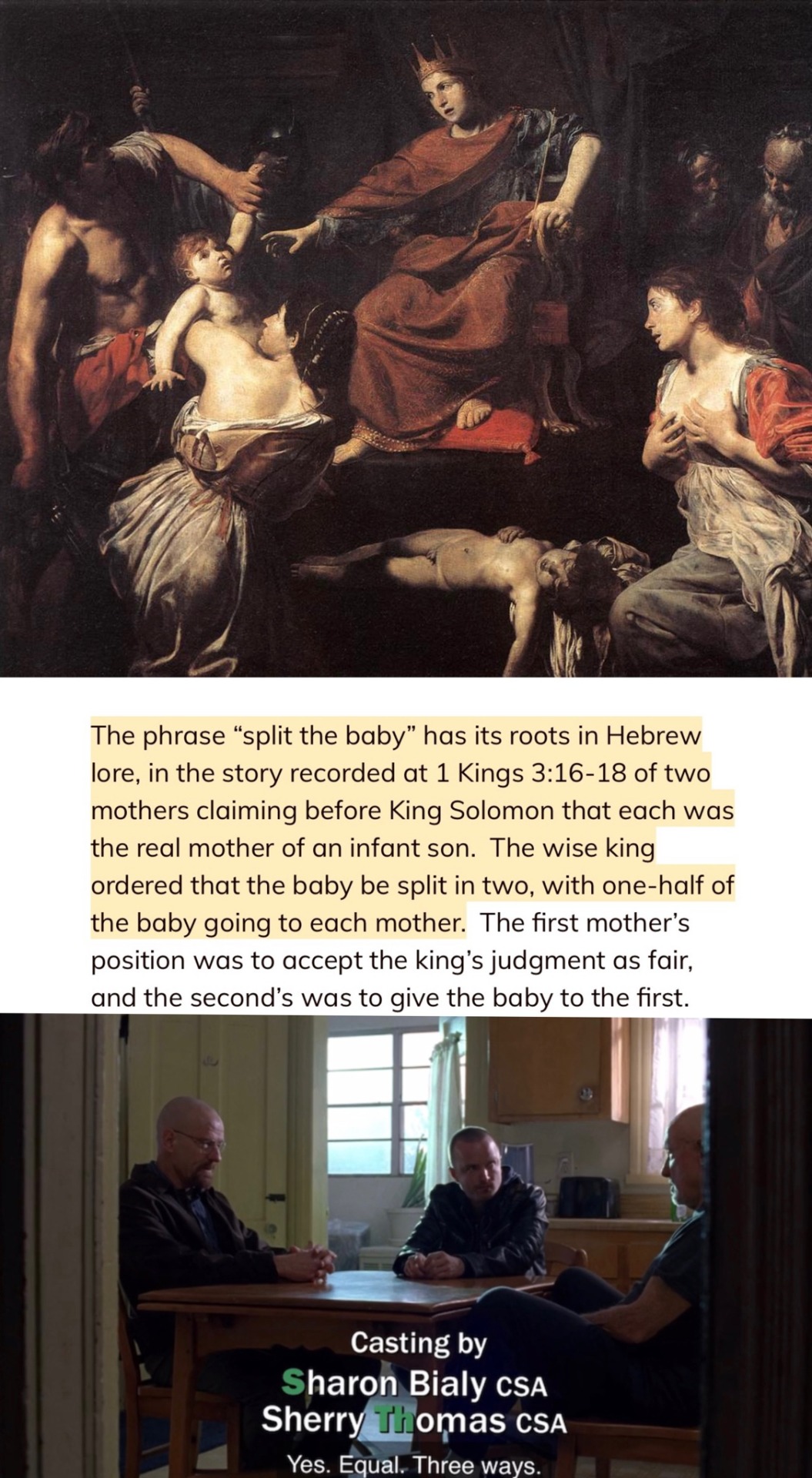
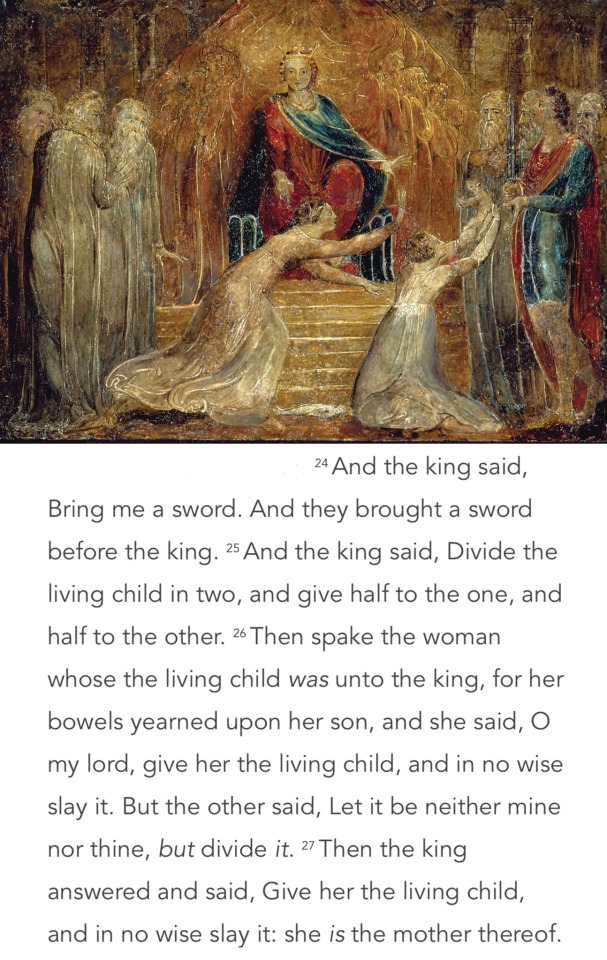
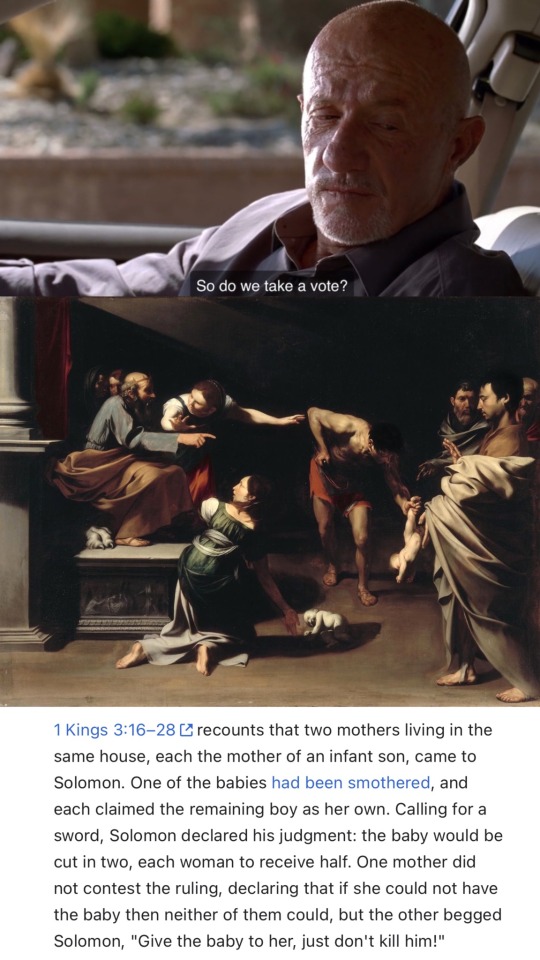
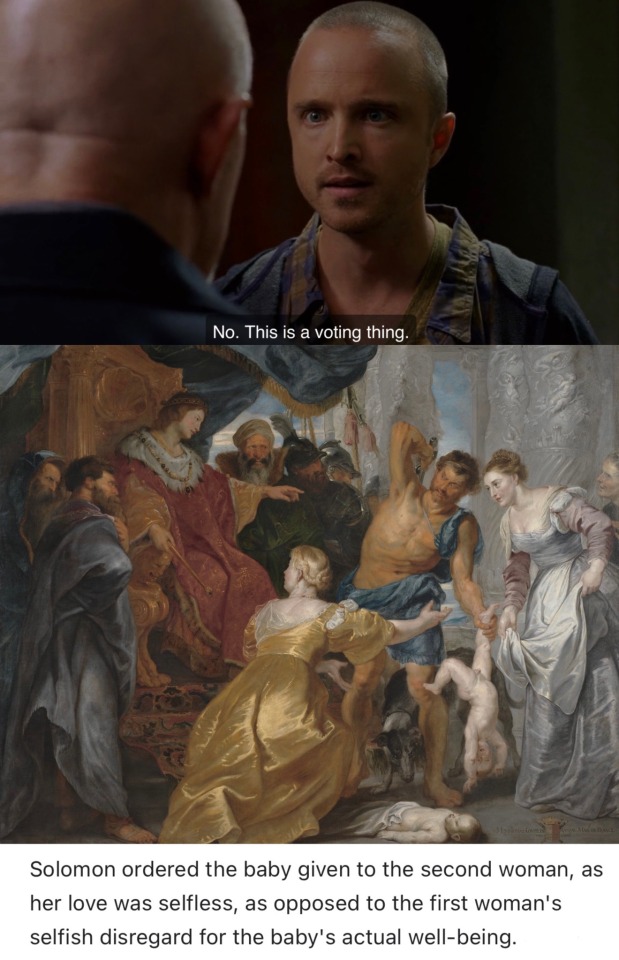

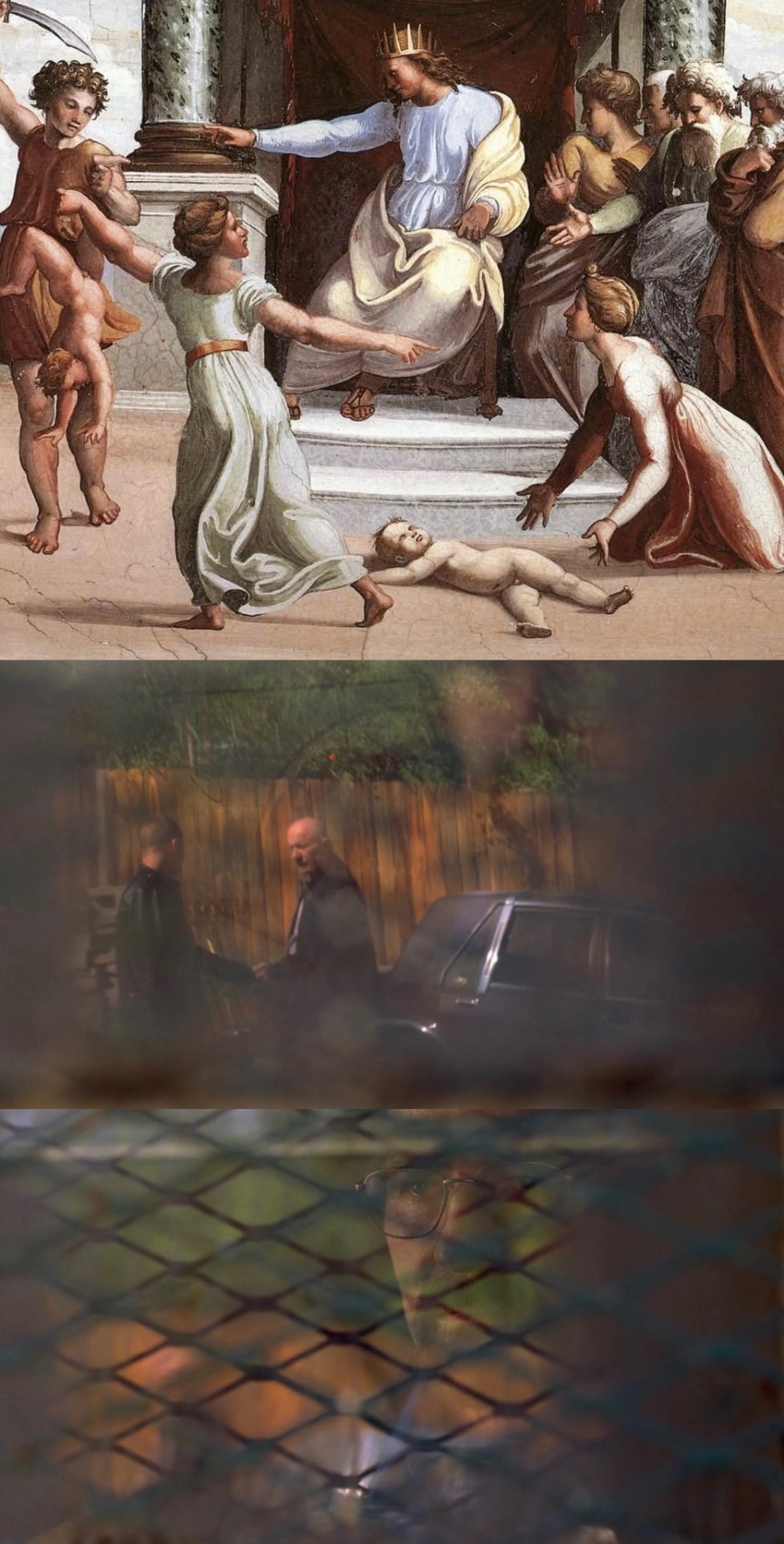
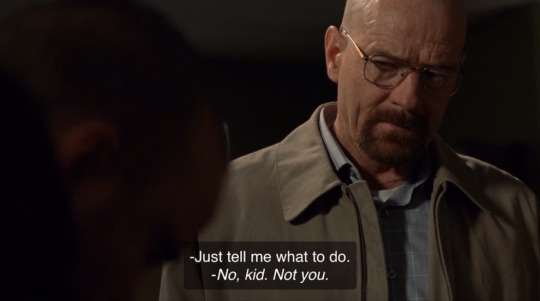


The Judgment Of Solomon / Mike, Walt, & Jesse
5x01 - Live Free or Die / Valentin de Boulogne / “Split the Baby” Negotiations - Philip Krause / William Blake / 1 Kings 3:24-27 - KJV / 5x03 - Hazard Pay / José de Ribera / 5x04 - Fifty-One / Peter Paul Rubens / 5x06 - Buyout / William Dyce / Raffaello Sanzio da Urbino / 5x07 - Say My Name
#oh don’t mind me just feeling. a lot#oh it speaks#breaking bad#web weaving#brba#mike ehrmantraut#jesse pinkman#walter white#art#comparatives#brbabcs#jesse#words#theology#child death tw
364 notes
·
View notes
Text
Reblog and put in the tags what your current career/degree is* vs the career/degree that, in retrospect, you should have gone into, knowing what you now know about yourself.
(This is NOT your dream job (who dreams of labor lol), but rather the career that your 18yo self didn’t know to explore/wasn’t encouraged to choose)
* please be as vague as needed so as not to doxx yourself 🙏 internet safety first always
#I’m in law and I absolutely love every single day of my life and my job#but if I was to start everything over from the beginning - I probably should have gone into computer science and programming#the thing I love to do most in my free time is code and learn about computer engineering#but I was labeled “bad at math” so I didn’t try for a STEM degree ¯\_(ツ)_/¯#alternatively: seminary/theology#shut up e#I’m actually curious in the responses and will probably be reading all the tags lol
61 notes
·
View notes
Text
Rewatched the emily episode. What the hell did she mean by "innocent people?"
#hazbin hotel critical#if she used “people who actually want to change”#or#like#“people who are genuinely trying”#then that would be better#but i forgot those hh fans are gonna crucify me#and say that it isnt a Christian show#like literally is this about christian theology??#or a bad take on it?
33 notes
·
View notes
Text
The biblical need for a Good Omens season 2 musical is real, palpable, burning, and giving the final circle of hell.
Listen, maybe I've been watching too much Hazbin Hotel, and so the notion of Heaven/Hell musicals is stuck in my head- but HEAR ME OUT:
We're on one of the last songs on the soundtrack. Aziraphale is fluttering around the bookshop because he's about to confess his feelings for Crowley. He's singing his little heart out about how, after all this fear and self-loathing, he is finally ready to step out and go after what HE wants, not what Heaven wants. He's prepared, he's in love, and he's done with heavens bullshit. We get to the final chorus, and BOOM. Metatron walks in, cutting Aziraphale off, and asks to speak with him, and Aziraphale agrees.
The next song is instrumental because we, like in the show, have no real idea what was discussed in that meeting. It starts off cheery, maybe a little tense, before it gets somber.
And listen, all I need is a song where Crowley has just watched Aziraphale get into that elevator without looking back, and his heart breaks. I need him, specifically David Tennant, to sing about how Crowley will probably never get over Aziraphale and how, despite constantly waiting for him, it is killing him; it is a death he will gladly accept. I need a song where his rage melts into sadness, and we get a laid-back Crowley just asking if Aziraphale or God can hear him, asking why.
The last thing we hear is that the Bentley is starting up and driving down a busy street in Soho- but if you listen carefully, you can hear a nightingale singing in the background because the story isn't over.
#michael sheen#david tennant#good omens#aziraphale#crowley#neil gaiman#good omens season 2#go2 spoilers#I'm FINE okay?#I'm totally not still recovering from season 2#I'm a completely normal college student#I feel bad for whoever hires me as their lawyer in the future#because I'm sure I'll do fine with the law part#but they'll have to deal with never knowing their lawyer is fucking insane about theology related media#your honor
25 notes
·
View notes
Note
top 10 favorite academic papers pretty please!!!!
love u anon <33 here u go:
"Taste and see that the Lord is sweet" (Ps. 33:9): The Flavor of God in the Monastic West by Rachel Fulton (this fully was a work of art. from the discussion at the beginning of what it means to taste to the fictional interlude of the reader talking to rupert von deutz.. im forever in love w this one)
WOUNDING, SEALING, AND KISSING: BRIDAL IMAGERY AND THE IMAGE OF CHRIST by Lieke Smits (didnt talk about anything else for like a week after reading this. this ones less on here for the way its written and more for what its about bc im obsessed w devotional literature and recountings of visions of christ)
Wilde's "Salomé" and the Ambiguous Fetish by Amanda Fernbach (the only thing u'll ever need to read on salome. kidding ofc but this was by far the most interesting discussion about salome that i've ever read)
Masochism and Piety by Robert M. Pierce (a classic for this blog. i've literally posted about this one time and time again and for good reason tbh. only thing that im still mad about is that i cant find the cited prayer tracts anywhere online </3)
Erotic Martyrdom: Kingsley's Sexuality beyond Sex by Charles Barker (i'll never get tired of reading about kingsley. and every time u hear the words "erotic" in a theological context trust i will be there lmao)
Praying the Rosary: The Anal-Erotic Origins of a Popular Catholic Devotion by Michael P. Carroll (this ones rlly just here bc it was so balls to the wall. personally i dont think theres much actual academic value here but i love it anyway)
Rolle's Eroticized Language in The Fire of Love by Brad Peters (could talk about richard rolle for days. & this paper is exactly about what i find so interesting about him & devotional lit in general - the reader/writer dynamic and which role the writer assigns each of them)
Sociology and the Problem of Eroticism by Chris Shilling and Philip A. Mellor (the one sociological paper in here lmao. i prommy thats not on purpose, im just more of a book reader when it comes to sociology)
Touching and Not Touching: The Indirections of Desire by Naomi Segal (esp the part about getting inside the body of the other. originally only started reading this for dead ringers related reasons but its so dear to me now. i just love discussions about the senses in general)
Totalitarian Lust: From "Salò" to "Abu Ghraib" by Eduardo Subirats, Christopher Britt Arredondo (was trying to get more into film studies and such so i just randomly typed in a few of my favourite movies to see if something popped up and then i found this masterpiece)
#the theme of this blog continues to be eroticised theology#wish there were some about nazisploitation on here but i have yet to find a single good paper on that...#i do feel a bit bad for the lack of sociological stuff on here but rn the only sociological essays im reading r about farming for my exam#so im mad at her (sociology) rn#ask
61 notes
·
View notes
Text
Watching fantasy high and i had a thought.
I noticed there was an idea about diety and religion kind of baked into the theology of Brendan's world building that made me wonder about religion in real life. And that is the idea that the goal of religious practice is to find The Religion and The Diety that you commit to forever and vice versa. It's baked into the mechanics of how the existence of dieties work. Gods need worshippers to exist, which would motivate them to be possessive and demand loyalty. The no-telling-about-dead-gods law is a good example of this. Gods don't share, and you can't change religions.
The idea kind of stands out because it feels familar. I realized it mirrors how we think of God in western culture. The idea of a jealous, possessive God is very prevalent in our culture maybe even fundamental. When I thought about ancient religions with big pantheons I kind of imagined people would pick one diety to be their diety and specifically only worship them forever even if they believed other gods existed, the way Christians treat the christian God. But I realized that was because my understanding of religious practice comes from a Christian background. God is a jealous God is a Christian/Jewish/Islamic idea.
Realizing that kind of brought it into question. I wondered what an alternative would be like. Maybe a better system for human beings would be to allowed more flexibility. It's natural to move through life and change and evolve. A lot of people might need different things and different times in their life. Maybe you need Jesus at one point but then later in life you need the Tao. Maybe you need the Moon Goddess at one point, but experience something you need permission to rage about.
Using the context of Fantasy High as an analogy, maybe it would make more sense if deities were allowed to actively share. Why couldn't they pass along worshippers who needed more doubt in their life to Cassandra? Why couldn't a God aks if their worshipper needed something different and try to help them find that? (Of course, mechanics come into question here but Im guessing those mechanics happened because of Sir Terry Pratchett. But that's another conversation.)
In the real world I think this is just as relevant. What if expecting one religion to work for a person forever is not a healthy expectation? Maybe there are people who would fit in as Christians forever. But maybe there are a lot of people who don't. What could be possible if we had a concept of flexibility in religious practice and belief? Why do we expect gods to be possessive?
Also makes me wonder. Whose idea was it to create that law in Fantasy High that forces the Gods to compete all the more fiercely? 🤔
#fantasy#fantasy high#brennan lee mulligan#bad kids#gods#goddesses#pagan#paganism#christianity#theology#dnd#d&d#religion#exmo#dimension 20#literature#monotheism#pantheism
26 notes
·
View notes